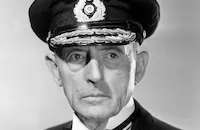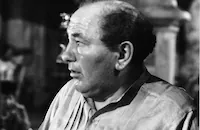When writer Melchior Lengyel heard that MGM was looking for a comedy vehicle for Garbo, he made a three-sentence pitch that became the springboard for what became her next smash hit. He said simply, "Russian girl saturated with Bolshevist ideals goes to fearful, Capitalistic, monopolistic Paris. She meets romance and has an uproarious good time. Capitalism not so bad after all." Several titles were proposed including Give Us This Day, This Time For Keeps and A Kiss From Moscow, which was deemed too political to attract an audience. Eventually the studio settled on Ninotchka, the name of Garbo's character, a Russian envoy sent to Paris to expedite the sale of some jewels. Charles Brackett, Billy Wilder and Walter Reisch were tapped to complete the script, and Ernst Lubitsch was hired to direct .
German born Lubitsch, noted for his "Lubitsch Touch" of sophistication and wit, was a director that Garbo admired and wanted to work with, though this film was their only collaboration. While Lubitsch respected Garbo the actress, he also found her to be the most inhibited person he had ever worked with. Her insecurity was noted by several people who recalled her habit of barring most everyone from the set who wasn't directly involved with the scene at hand. Billy Wilder recalled having to sneak onto the set and hide whenever he wanted to see how his script was coming along. Garbo was also embarrassed to perform a key scene in Ninotchka that called for her to be drunk - a state she found unbecoming and difficult to play.
Cary Grant was the first choice to play opposite Garbo as her Parisian paramour Count Leon d'Algout, but when he turned the part down the role went to dashing Melvyn Douglas, who had starred with Garbo once before in As You Desire Me (1932). Douglas claimed in his autobiography that despite the film's ad "Garbo Laughs!" the actress "was unable to articulate so much as a titter during the shooting of the restaurant scene." Though her laugh comes across heartily in the film, Douglas was never certain if it was really her voice or if it had been dubbed later. As the Grand Duchess Swana and Garbo's adversary in the film, Ina Claire made for an intriguing casting choice. Garbo had had a very publicized affair with Claire's former husband, actor John Gilbert, some years earlier during the filming of the 1926 silent classic Flesh and the Devil. Hungarian actor Bela Lugosi of Dracula (1931) fame also has an amusing if small role in Ninotchka as Commissar Razinin.
It was a delicate matter to actively criticize the politics of the Soviet Union and Communism in 1939, but Ninotchka pulls it off through its use of satire to demonstrate the draw of Western culture and Capitalism. Upon its release it was banned in Soviet satellite countries. Garbo's role as a woman in a position of power - a serious, intelligent and dedicated party member - was also bold for its time, even if the hard-nosed Ninotchka is susceptible to the pleasures of Paris in the spring.
Garbo's first foray into comedy was a triumph. Howard Barnes of The New York Herald Tribune said, "Now that she has done it, it seems incredible that Greta Garbo never appeared in a comedy before Ninotchka; the great actress reveals a command of comic inflection which fully matches the emotional depth or tragic power of her earlier triumphs." Though it was nominated for four Academy Awards that year including Best Actress and Best Picture, it lost to the momentous Gone With the Wind. Ninotchka has remained a classic, however, and in 1990 it was added to the Library of Congress National Film Registry.
Producer/Director: Ernst Lubitsch
Screenplay: Melchior Lengyel (story), Charles Brackett, Billy Wilder, Walter Reisch
Art Direction: Randall Duell, Cedric Gibbons
Cinematography: William Daniels
Costume Design: Adrian (gowns)
Film Editing: Gene Ruggiero
Original Music: Werner R. Heymann
Cast: Greta Garbo (Ninotchka (Nina Ivanovna Yakushova)), Melvyn Douglas (Count Leon d'Algout), Ina Claire (Grand Duchess Swana), Bela Lugosi (Commissar Razinin), Sig Ruman (Michael Simonavich Iranoff (as Sig Rumann).
BW-111m. Closed captioning. Descriptive video.
by Andrea Foshee








































